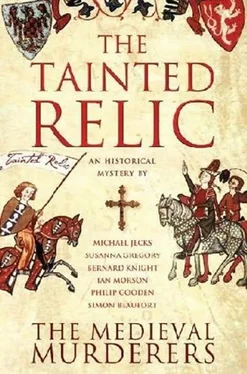His sun-burned face stood out like a sore thumb amidst the pale-faced tradesmen setting out their wares in the streets of Oxford. When the man chose to, however, he could blend with shadows, and disappear into the background. He had the uncanny ability to seemingly appear out of nowhere. A skill he had learned from his deadly enemies, the Hashishin, or hashish-eaters, of the East. The more popular term for them nowadays, under their current leader, the Old Man, was Assassins. But today there was no need for him to hide away, and sneak down alleys. Today he could be his more natural self, upright soldier and Poor Knight of Christ and the Temple of Solomon. As he entered the North Gate of the town, Matthew Syward, the watchman, having only just opened the gate, observed the tall man of military bearing with interest. Syward’s wife was a termagant, and he often dreamed of living the life of a soldier. He imagined that this one was probably returning from a night roistering in the stews of Broken Hays. He tipped a knowing wink at the soldier as he passed. But the man ignored him, and began to weave his way through the growing press of people. Oxford was always busy at the time of St Frideswide’s Festival, the normal bustle of the town being swollen by the presence of the blind, the lame and the scrofulous come for a cure. And by the unwelcome presence of beggars and pick-pockets. The watchman cursed the haughty soldier for his high-and-mighty attitude, hoping he would lose his money to a cutpurse. Matthew Syward didn’t like people who thought they were a cut above him, even if in truth they were. He would remember the man.
Unaware of the unfortunate impression he had created on the watchman at the gate, the Templar returned to the Golden Ball Inn, where he was staying. He had been lucky to find a room at such a busy time, but then good gold coins had helped. He suspected the sour-faced merchant who now sat in the corner of the inn, atop his bags, had been evicted from his room owing to the Templar’s own generous offering to the innkeeper. The sight gave him a twinge of guilt as he sat down to a breakfast of bread and ale. After all, his monastic vows had included that of poverty. But then again, he had experienced a tiring journey, and his quest was at the behest of the Grand Master, no less. That it contained a secret and personal element too he had divulged to no one. Yesterday had supplied a promising start to his search. And this morning might have seen its culmination. His early morning errand had been unsatisfactory, however. Nevertheless, he relished the taste of the freshly baked bread the serving-maid had provided. Later, his body and mind refreshed, he would continue his search. Absently, he rubbed at a fresh brown stain on his sleeve.
Falconer left the constable, Peter Bullock, brooding over the corpse, and after telling the pasty-faced John Hanny to return to Aristotle’s and eat something from the Master’s own supplies, he carried on towards Oseney Abbey. Bullock had been unusually excited since seeing the face of the dead monk, but would not tell his friend what bothered him. Falconer knew better than to press him on the matter. He would find out soon enough, no doubt. For now, he had to break the news to someone at the abbey that one of their canons had been murdered in quite unusual circumstances. After that, he would unburden himself of the affair. He did not relish getting embroiled in the jurisdictional arguments that would ensue over who should prosecute the case. The monk had probably been killed by someone from the town, and Bullock would expect to play his part. But the land on which he was killed belonged to the abbey. Moreover, the monk probably taught at one of the university schools, so the Chancellor would no doubt become involved too. Falconer would be well out of this nightmare.
As he crossed the raised causeway leading to the abbey, he startled some magpies in the field to his right. They rose in a clatter of wings, their tails held stiffly behind them. They reminded him of the story of the founder of the abbey, Robert d’Oyly, whose wife, Editha, had seen some magpies chattering in the selfsame fields. Only she had seen them as souls in purgatory crying out for prayers. Her vision had resulted in the founding of the abbey. He counted these magpies as they flew up. There were seven of them.
Entering the abbey through its main gate, Falconer hesitated, pondering who to talk to first. As it was well past dawn, the abbot would no longer be in the chapter house. And the service at prime was over. In years past, the monks would now have been occupied with manual labour. But times had changed for the abbot and his fellows. The lay brothers did that sort of work, while the canons devoted themselves to prayer and contemplation. The old aphorism that the world divided itself into three classes-those who fought, those who laboured and those who prayed-had a great deal of truth in it. Especially within the walls of an abbey.
As he made his way through the cloisters, he saw a familiar figure approaching him. Brother Peter Talam was the bursar of Oseney, occupying himself with all its external affairs, especially the rebuilding work that was still in progress twenty years after its initiation. He was a large man with a severe mien, and his steps were as short and as stiff as his manner. This always gave him the appearance of someone in a hurry. Indeed, he was so preoccupied that he almost ran into Falconer, rearing back like a charging horse only at the last minute.
‘Master Falconer. I did not see you. It has been a long while.’
Falconer recalled that when they had last spoken some years earlier, he had been investigating the strange affair of the death of the papal legate’s cook. That had been an unpleasant time for the abbot and the bursar. It appeared that now he was in danger of being embroiled in a similar business.
‘Brother Peter. I imagine you are busy.’
Talam’s life was one of bustle, so it was no surprise when he averred that he was indeed so.
‘Yes, I am. La Souch is not in evidence, and his men are just sitting around awaiting his instructions.’
Falconer wondered whether this missing La Souch was the monk he had found in the meadows. But then, why would Talam refer to ‘his men’?
‘La Souch?’
‘La Souch. Eudo La Souch. He is the master mason in charge of our building works. A surly fellow from the Low Countries who thinks he can come and go as he pleases.’
Falconer saw the glint of battle in Brother Peter’s eyes. He felt sorry for this Hollander, if he thought he could best Brother Peter. Many a wily tradesman from the town had tried, and lived to rue the day. Still, if he was a master mason, then he was a person of no small intelligence, who had progressed through a training no less arcane than that endured by any master of philosophy at the university. And he would possess secret knowledge of formulae as complex as those of any mathematical savant. If anyone could give Talam a run for his money, maybe it was Eudo La Souch.
By now, the bursar was dancing on his toes, unable to contain his staccato little trot any longer. He was bothered by more than the missing master mason apparently.
‘What is more, Brother John Barley did not appear for prime this morning. The abbot, being charitable, is fearful for his health, seeing that he and Brother John are of an age. So I must seek out an errant brother, as well as La Souch.’
The bursar sounded exasperated at being required to run around tracking down missing canons who should know better. But Falconer thought that perhaps Brother John Barley had a very good reason for his non-attendance. Before Talam could race off about his errands, he grabbed the monk’s arm. He knew the abbot was quite elderly. So the missing John Barley would be so too.
Читать дальше












